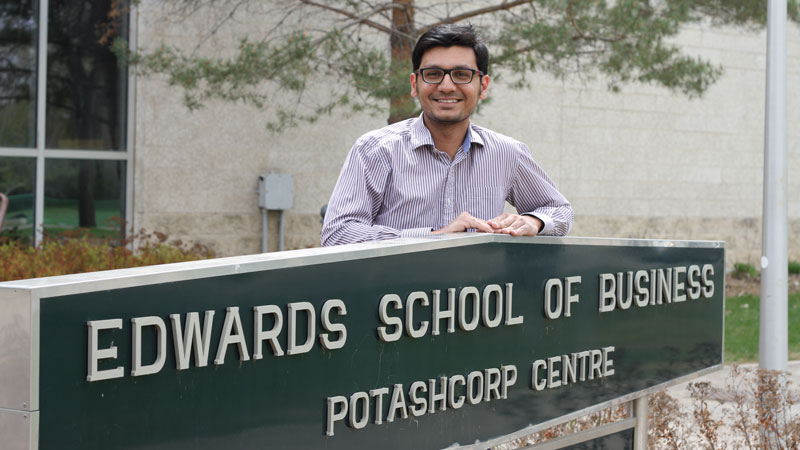
Pakistan to the Prairies: Edwards student celebrates long journey to U of S degree
Until he came to Saskatoon, religious persecution was an everyday part of Rashid Ahmed’s life.
Ahmed and his family were no strangers to violent, menacing treatment in their home country of Pakistan, where federal law excised their Ahmadiyya Muslim faith as illegitimate and lowered their status, legally and socially, in comparison to their fellow citizens.
“One day, some guys came and they told my family, ‘If you would not leave this house, we will kill your son or your husband,’” Ahmed said. “My brother at the time was not in the house and my father was at work, fortunately, but still they threatened my mom and my sister. When I heard that story, I asked them to leave that place right way. That’s not a good place to live.”
After earning a degree in finance but finding little in the way of work, Ahmed left Pakistan behind in 2012, immigrating to Canada as a land of new opportunities. Today he’s a proud alum of the University of Saskatchewan’s Edwards School of Business, graduating this spring with a degree in human resources. This year, in addition to being a U of S grad, he’s happy to say he will also become a full Canadian citizen.
Ahmed fell to his lowest point in his second year of school, an ocean away from his family and nearly completely incapable of helping them. But instead of giving in to thoughts of dropping out, he sought out ways to give back, taking on volunteer opportunities with the likes of Feed the Homeless, the Canadian Breast Cancer Foundation, and 5 Days for the Homeless, to meet new people and raise his spirits.
“I don’t think there was a weekend when I missed doing volunteer work,” he said, adding that his volunteerism culminated in being given the U of S Students’ Union Vera Pezer Award. “I was involved with different activities in Saskatoon because I believe that if you help others, God will help you.”
Ahmed is perhaps most satisfied with his work as president of the U of S branch of the Ahmadiyya Muslim Students’ Association (AMSA), a nationwide organization that aims to provide guidance and outreach opportunities for those of the Ahmadiyya Muslim faith.
During his two-year tenure as president, Ahmed was the proud recipient of the AMSA Excellence Award. The commendation came as a result of his leadership in projects like Stop the CrISIS—an event aimed at curbing the spread of the Islamic State of Iraq and the Levant’s radicalization of youth—as well as hosting Meet a Muslim Family community-building opportunities and working toward reconciliation with Aboriginal student groups on campus.
Ahmed also used his connections within the Saskatoon Muslim community to arrange a warm reception for the first wave of Syrian refugees to their new home on the Prairies, and even learned some Arabic for the occasion.
“The first flight that came to Saskatoon for Syrian refugees, around 60 more people went to the airport to welcome them and tell them, ‘You are in a safe place,’” Ahmed said. “Myself and my cousins actually sang a song in Arabic for Syrian refugees, to show them they are in the safest and best place to live.”
In April 2014, Ahmed’s mother joined him in Saskatoon under refugee status. By December of the following year, his father and sister would follow suit.
After his family’s arrival, and with connections from his degree program, Ahmed added nearly 35 weekly hours of work with the Saskatchewan Ministry of Highways to his already-hectic academic and volunteering schedule, in order to keep everyone in house and home.
The hours were long, often involving Ahmed sneaking away from campus between classes to squeeze in a few hours of work, but he said having his family by his side in a country that actually appreciates them makes it all more than worthwhile.
“I spent my school and my university (in Pakistan) pushed down—by my colleagues, by my friends, by my professors even—because of my minority status,” he said. “In Canada, I have freedom to live. I always tell people, everywhere, that I’m proud to be Canadian.”
